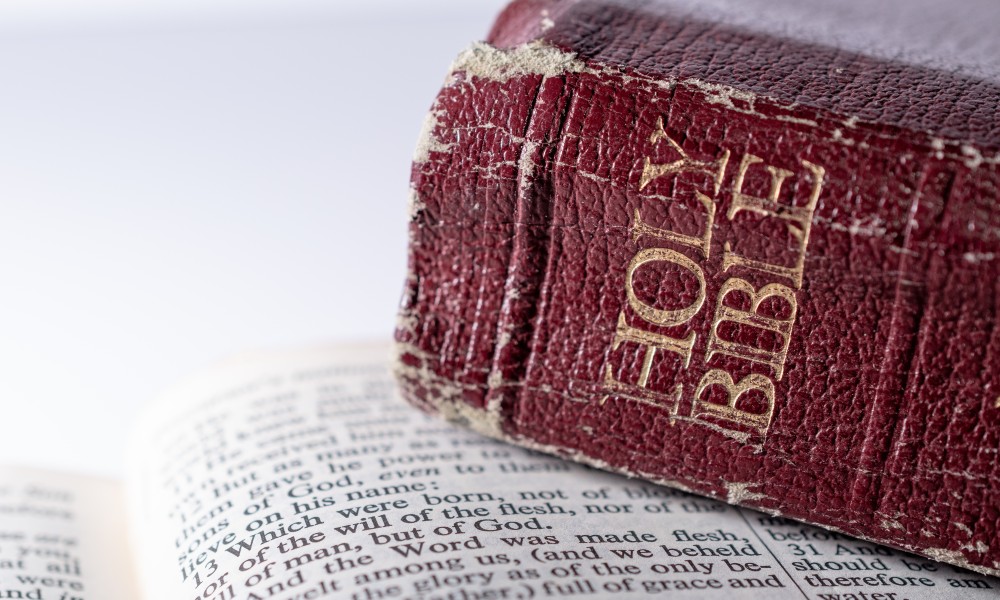7 Tips for Keeping Your Bible in Good Condition

For many devout Christians, their Bible is a lifelong companion on their spiritual journey. True devotion to the Bible goes beyond reading and study; it encompasses cherishing the physical book itself. Without proper maintenance, your Bible may become marred by stains, tears, warping, and more. Therefore, knowing these seven tips for keeping your bible in good condition can ensures that this precious item can be passed down through generations, retaining its significance and essence.
Whether it's a family heirloom or a personal 1611 KJV Bible, the care we put into preserving our Bibles reflects the reverence we hold for the Word. A Bible left to gather dust may suggest that its owner isn’t serious about daily studying the word of God or putting God’s word into action in their everyday life. On the other hand, Bibles that are used regularly can begin to show signs of wear and tear if they are not maintained properly. These tips should help you keep your Bible in good condition, ready for you to read every day:
Wash Your Hands
This might seem like a simple reminder, yet it's one of the most crucial steps to maintain your Bible's pristine condition. Our hands encounter various substances throughout the day, from natural oils to the residues of whatever we've touched. Before opening your Bible, ensure your hands are clean and dry to prevent staining the pages or transferring any dirt onto them.
Don’t use greasy hand lotions or soaps prior to reading your Bible. Your hands already have natural oils on them that can leave traces on the pages and cover of your Bible, causing it to deteriorate over time. Clean hands can fend off this decay and prevent you from having to invest in a replacement Bible.
Close Your Bible When You're Finished Reading
Leaving your Bible open for extended periods, especially if you're not actively reading it, can place unnecessary stress on the spine and binding. Closing your Bible when you're done for the day maintains its structural integrity, ensuring the pages stay securely fastened and the spine remains undamaged, preserving your Bible's longevity.

Store Your Bible Properly
Proper storage is key to the longevity of your Bible. Avoid places with extreme temperature changes or high humidity, as these conditions can lead to the deterioration of the pages and bindings. Ideally, keep your Bible in a dry, cool place, lying flat or standing upright. If standing, ensure it's supported on either side to prevent it from slumping or warping.
Some people store their Bibles in special boxes or covers to keep dust off, light out, and to protect it from spills and accidents. If you choose to use a storage box, make sure you keep it somewhere safe yet accessible so you can take your Bible out and read it every day.
Use Highlighters That Don't Bleed Through
Many readers love to highlight passages that resonate with them, but choosing the right highlighter is fundamental. Opt for highlighters that won’t bleed through the thin pages. This way, you can emphasize your favorite verses without compromising the readability of the text on the other side of the page.
Annotations Are OK But Don't Stuff Your Notes Into Your Bible
Making annotations or jotting down insights can enhance your study sessions. If you like to make margin notes, purchase a study Bible as a supplement to your standard Bible. These Bibles are printed in a way that leaves room for margin notes, so you don’t risk obscuring the text with what you’re writing about it.
Also, if you write in or highlight your Bible, be gentle. In order to fit the entire text of the Bible into a manageable sized book, most Bibles are printed on tissue-thin paper. Careless scribbling or highlighting could tear the pages, making the passage you were moved to annotate unavailable to you in your personal Bible.
Additionally, stuffing loose papers, sticky notes, bookmarks, or other materials into your Bible can strain the binding over time and damage the pages within. Instead, consider keeping a separate notebook or a digital document for your reflections and additional notes related to your readings.
Keep Your Bible Out of the Sun and Away From Debris, and Food and Drinks
Exposure to direct sunlight can fade the cover and pages of your Bible, while debris, such as dust and dirt, can damage its delicate pages. Similarly, food and drinks pose a risk of spills and stains. Being mindful of where you read and study your Bible can help protect it from these potential hazards.

And while you may hope to have some peaceful, quiet time on a sunny summer day to read and contemplate your Bible outdoors, the beach or the town pool is not the place to do it. There’s simply too great a risk of splashed water, sand, insects, greasy sunscreen, and any snacks or drinks you may have brought along.
Get A Leather-Bound Bible or a Leather Cover for Your Bible
Leather-bound Bibles not only exude elegance but also durability. Leather is more resistant to wear and tear compared to other bindings and can protect the pages more effectively. If you're investing in a new Bible or looking to upgrade your current one, consider a leather-bound edition for increased longevity. A 1611 KJV Bible encased in leather is not only a beautiful, durable keepsake but within the leather binding lies a robust, authoritative version of the Bible that has withstood the test of time.
Implementing these seven tips for maintaining your Bible in good condition can significantly extend its lifespan, allowing you to treasure your Bible for many years to come. Whether you're engaged in daily devotionals, studying biblical passages, or seeking guidance and comfort from the scriptures, your Bible is a sacred repository of wisdom and faith. By caring for it with the reverence it deserves, you ensure that it remains a cherished companion on your spiritual voyage, embodying the timeless teachings and enduring love that it represents.
